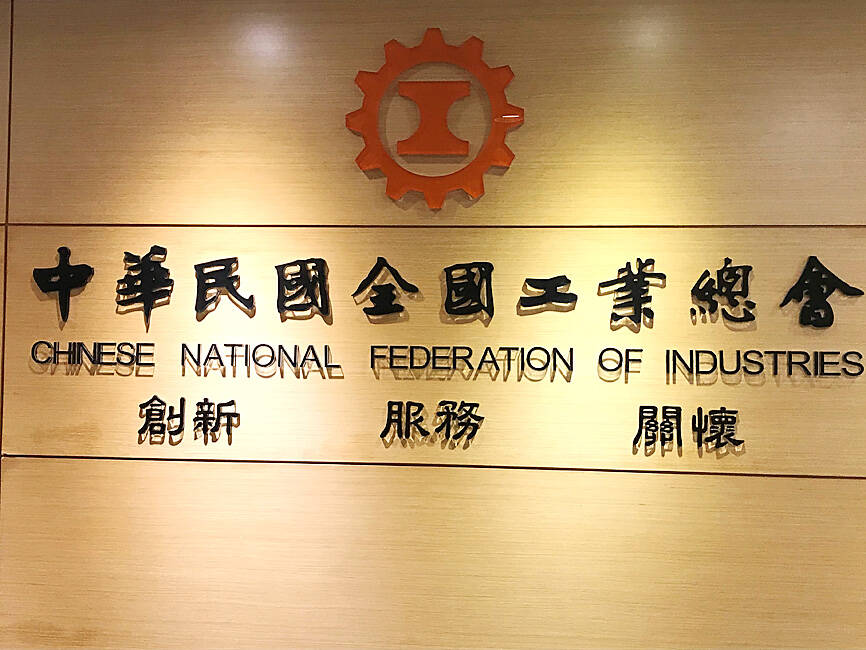The Chinese National Federation of Industries (CNFI, 全國工業總會) yesterday urged the government to support tariff-affected sectors as fast as possible, as shocks to Taiwan’s export-reliant economy from higher US levies has spread across the board locally.
The government should lower the requirement for affected sectors applying for emergency relief and solicit industry opinions for trade negotiations with the US, the CNFI said.
“The government should adjust its threshold for subsidies based on industry types, enterprise sizes and actual impact, as the affected firms include mainly small and medium-sized enterprises,” it said.

Photo: Lee Ya-wen, Taipei Times
“The government also needs to understand the latest developments in various sectors, such as machinery, machine tools, electrical and electronic equipment, petrochemicals, hand tools, textiles and vehicles, and adjust its policies and programs flexibly,” it added.
The CNFI’s remarks came after the Cabinet on Friday pledged to provide NT$88 billion (US$2.66 billion) to help Taiwanese businesses, including the electronics, metal and steel industries, that would be hardest hit by US President Donald Trump’s “reciprocal tariffs.”
On Sunday, President William Lai (賴清德) said Taiwan would negotiate with the US, starting with a goal of “zero tariffs,” modeled after the US-Mexico-Canada Agreement, while pledging to expand its investments in the country.
While increasing investments in the US to reduce Taipei’s trade surplus with Washington, the government also needs to expand domestic demand and increase public construction projects, as well as encourage the use of domestic machinery equipment, the CNFI said.
As manufacturers of different scales face different issues in terms of logistics, customs clearance and market development, the government could set up professional consultation platforms for local firms, it added.

The Eurovision Song Contest has seen a surge in punter interest at the bookmakers, becoming a major betting event, experts said ahead of last night’s giant glamfest in Basel. “Eurovision has quietly become one of the biggest betting events of the year,” said Tomi Huttunen, senior manager of the Online Computer Finland (OCS) betting and casino platform. Betting sites have long been used to gauge which way voters might be leaning ahead of the world’s biggest televised live music event. However, bookmakers highlight a huge increase in engagement in recent years — and this year in particular. “We’ve already passed 2023’s total activity and

BIG BUCKS: Chairman Wei is expected to receive NT$34.12 million on a proposed NT$5 cash dividend plan, while the National Development Fund would get NT$8.27 billion Taiwan Semiconductor Manufacturing Co (TSMC, 台積電), the world’s largest contract chipmaker, yesterday announced that its board of directors approved US$15.25 billion in capital appropriations for long-term expansion to meet growing demand. The funds are to be used for installing advanced technology and packaging capacity, expanding mature and specialty technology, and constructing fabs with facility systems, TSMC said in a statement. The board also approved a proposal to distribute a NT$5 cash dividend per share, based on first-quarter earnings per share of NT$13.94, it said. That surpasses the NT$4.50 dividend for the fourth quarter of last year. TSMC has said that while it is eager

‘IMMENSE SWAY’: The top 50 companies, based on market cap, shape everything from technology to consumer trends, advisory firm Visual Capitalist said Taiwan Semiconductor Manufacturing Co (TSMC, 台積電) was ranked the 10th-most valuable company globally this year, market information advisory firm Visual Capitalist said. TSMC sat on a market cap of about US$915 billion as of Monday last week, making it the 10th-most valuable company in the world and No. 1 in Asia, the publisher said in its “50 Most Valuable Companies in the World” list. Visual Capitalist described TSMC as the world’s largest dedicated semiconductor foundry operator that rolls out chips for major tech names such as US consumer electronics brand Apple Inc, and artificial intelligence (AI) chip designers Nvidia Corp and Advanced

Pegatron Corp (和碩), an iPhone assembler for Apple Inc, is to spend NT$5.64 billion (US$186.82 million) to acquire HTC Corp’s (宏達電) factories in Taoyuan and invest NT$578.57 million in its India subsidiary to expand manufacturing capacity, after its board approved the plans on Wednesday. The Taoyuan factories would expand production of consumer electronics, and communication and computing devices, while the India investment would boost production of communications devices and possibly automotive electronics later, a Pegatron official told the Taipei Times by telephone yesterday. Pegatron expects to complete the Taoyuan factory transaction in the third quarter, said the official, who declined to be